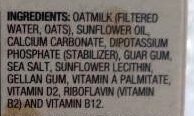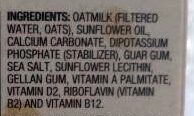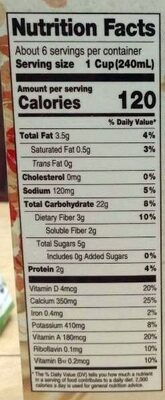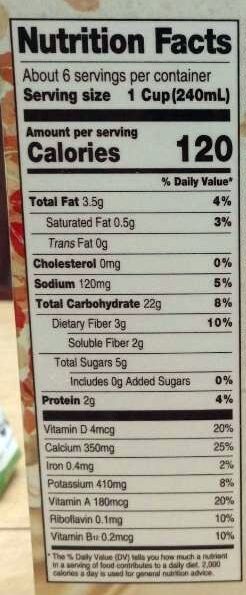Help us make food transparency the norm!
As a non-profit organization, we depend on your donations to continue informing consumers around the world about what they eat.
The food revolution starts with you!
Extra Creamy Oatmilk Original - Planet Oat - 52 oz (1.54 l)
Extra Creamy Oatmilk Original - Planet Oat - 52 oz (1.54 l)
This product page is not complete. You can help to complete it by editing it and adding more data from the photos we have, or by taking more photos using the app for Android or iPhone/iPad. Thank you!
×
Barra-kodea: 0044100156199 (EAN / EAN-13) 044100156199 (UPC / UPC-A)
Kopurua: 52 oz (1.54 l)
Ontziratzea: en:multilayer-composite, Tetra Pak, en:Brick
Markak: Planet Oat
Brand owner: PLANET OAT
Kategoriak: en:Plant-based foods and beverages, en:Beverages, en:Plant-based foods, en:Cereals and potatoes, en:Dairy substitutes, en:Cereals and their products, en:Milk substitutes, en:Plant-based beverages, en:Specific products, en:Plant-based milk alternatives, en:Products for specific diets, en:Products without gluten, en:Cereal-based drinks, en:Oat-based drinks
Etiketak, ziurtagiriak, sariak:
en:No gluten, Kosher, en:No artificial flavors, en:No artificial preservatives, en:No GMOs, en:Pasteurized, Calcium source, No added sugar, en:No artificial colors, en:No lactose, en:No milk, en:No nuts, en:No peanuts, en:No soy, en:Non GMO project, en:Orthodox Union Kosher, Vitamin A source, Vitamin D source

Origin of ingredients: Ameriketako Estatu Batuak
Manufacturing or processing places: Lynnfield, Massachusetts, Estados Unidos
Link to the product page on the official site of the producer: https://planetoat.com/products/extra-cre...
Dendak: Biomercado
Saltzen diren herrialdeak: Bolivia, Espainia, Ameriketako Estatu Batuak
Matching with your preferences
Health
Osagaiak
-
18 ingredients
: OAT MILK (FILTERED WATER, OATS), SUNFLOWER OIL, CALCIUM CARBONATE, DIPOTASSIUM PHOSPHATE (STABILIZER), GUAR GUM, SEA SALT, SUNFLOWER LECITHIN, GELLAN GUM, VITAMIN A (PALMITATE), VITAMIN D2, RIBOFLAVIN (VITAMIN B2), VITAMIN B12.Alergenoak: en:Gluten
Food processing
-
Ultra processed foods
Elements that indicate the product is in the 4 - Ultra prozesatutako elikagaiak eta edariak group:
- Gehigarria: E322
- Gehigarria: E412
- Gehigarria: E418
Food products are classified into 4 groups according to their degree of processing:
- Prozesatu gabeko edo ahalik eta gutxien prozesatutako elikagaiak
- Sukaldaritzako osagaiak prozesatu
- Prozesatutako jakiak
- Ultra processed foods
The determination of the group is based on the category of the product and on the ingredients it contains.
Gehigarriak
-
E322
Lecithin: Lecithin -UK: , US: , from the Greek lekithos, "egg yolk"- is a generic term to designate any group of yellow-brownish fatty substances occurring in animal and plant tissues, which are amphiphilic – they attract both water and fatty substances -and so are both hydrophilic and lipophilic-, and are used for smoothing food textures, dissolving powders -emulsifying-, homogenizing liquid mixtures, and repelling sticking materials.Lecithins are mixtures of glycerophospholipids including phosphatidylcholine, phosphatidylethanolamine, phosphatidylinositol, phosphatidylserine, and phosphatidic acid.Lecithin was first isolated in 1845 by the French chemist and pharmacist Theodore Gobley. In 1850, he named the phosphatidylcholine lécithine. Gobley originally isolated lecithin from egg yolk—λέκιθος lekithos is "egg yolk" in Ancient Greek—and established the complete chemical formula of phosphatidylcholine in 1874; in between, he had demonstrated the presence of lecithin in a variety of biological matters, including venous blood, in human lungs, bile, human brain tissue, fish eggs, fish roe, and chicken and sheep brain. Lecithin can easily be extracted chemically using solvents such as hexane, ethanol, acetone, petroleum ether, benzene, etc., or extraction can be done mechanically. It is usually available from sources such as soybeans, eggs, milk, marine sources, rapeseed, cottonseed, and sunflower. It has low solubility in water, but is an excellent emulsifier. In aqueous solution, its phospholipids can form either liposomes, bilayer sheets, micelles, or lamellar structures, depending on hydration and temperature. This results in a type of surfactant that usually is classified as amphipathic. Lecithin is sold as a food additive and dietary supplement. In cooking, it is sometimes used as an emulsifier and to prevent sticking, for example in nonstick cooking spray.Source: Wikipedia (Ingeles)
-
E322i - Lezitina
Lecithin: Lecithin -UK: , US: , from the Greek lekithos, "egg yolk"- is a generic term to designate any group of yellow-brownish fatty substances occurring in animal and plant tissues, which are amphiphilic – they attract both water and fatty substances -and so are both hydrophilic and lipophilic-, and are used for smoothing food textures, dissolving powders -emulsifying-, homogenizing liquid mixtures, and repelling sticking materials.Lecithins are mixtures of glycerophospholipids including phosphatidylcholine, phosphatidylethanolamine, phosphatidylinositol, phosphatidylserine, and phosphatidic acid.Lecithin was first isolated in 1845 by the French chemist and pharmacist Theodore Gobley. In 1850, he named the phosphatidylcholine lécithine. Gobley originally isolated lecithin from egg yolk—λέκιθος lekithos is "egg yolk" in Ancient Greek—and established the complete chemical formula of phosphatidylcholine in 1874; in between, he had demonstrated the presence of lecithin in a variety of biological matters, including venous blood, in human lungs, bile, human brain tissue, fish eggs, fish roe, and chicken and sheep brain. Lecithin can easily be extracted chemically using solvents such as hexane, ethanol, acetone, petroleum ether, benzene, etc., or extraction can be done mechanically. It is usually available from sources such as soybeans, eggs, milk, marine sources, rapeseed, cottonseed, and sunflower. It has low solubility in water, but is an excellent emulsifier. In aqueous solution, its phospholipids can form either liposomes, bilayer sheets, micelles, or lamellar structures, depending on hydration and temperature. This results in a type of surfactant that usually is classified as amphipathic. Lecithin is sold as a food additive and dietary supplement. In cooking, it is sometimes used as an emulsifier and to prevent sticking, for example in nonstick cooking spray.Source: Wikipedia (Ingeles)
-
E340
Potassium phosphate: Potassium phosphate is a generic term for the salts of potassium and phosphate ions including: Monopotassium phosphate -KH2PO4- -Molar mass approx: 136 g/mol- Dipotassium phosphate -K2HPO4- -Molar mass approx: 174 g/mol- Tripotassium phosphate -K3PO4- -Molar mass approx: 212.27 g/mol-As food additives, potassium phosphates have the E number E340.Source: Wikipedia (Ingeles)
-
E340ii
Potassium phosphate: Potassium phosphate is a generic term for the salts of potassium and phosphate ions including: Monopotassium phosphate -KH2PO4- -Molar mass approx: 136 g/mol- Dipotassium phosphate -K2HPO4- -Molar mass approx: 174 g/mol- Tripotassium phosphate -K3PO4- -Molar mass approx: 212.27 g/mol-As food additives, potassium phosphates have the E number E340.Source: Wikipedia (Ingeles)
-
E412
Guar gum: Guar gum, also called guaran, is a galactomannan polysaccharide extracted from guar beans that has thickening and stabilizing properties useful in the food, feed and industrial applications. The guar seeds are mechanically dehusked, hydrated, milled and screened according to application. It is typically produced as a free-flowing, off-white powder.Source: Wikipedia (Ingeles)
-
E418
Gellan gum: Gellan gum is a water-soluble anionic polysaccharide produced by the bacterium Sphingomonas elodea -formerly Pseudomonas elodea based on the taxonomic classification at the time of its discovery-. Its taxonomic classification has been subsequently changed to Sphingomonas elodea based on current classification system. The gellan-producing bacterium was discovered and isolated by the former Kelco Division of Merck & Company, Inc. in 1978 from the lily plant tissue from a natural pond in Pennsylvania, USA. It was initially identified as a substitute gelling agent at significantly lower use level to replace agar in solid culture media for the growth of various microorganisms Its initial commercial product with the trademark as "GELRITE" gellan gum, was subsequently identified as a suitable agar substitute as gelling agent in various clinical bacteriological media.Source: Wikipedia (Ingeles)
Ingredients analysis
-
en:Palm oil free
No ingredients containing palm oil detected
-
en:Vegan status unknown
Unrecognized ingredients: en:Oat milk, Kobalamina
-
en:Vegetarian status unknown
Unrecognized ingredients: en:Oat milk, Kobalamina
-
Details of the analysis of the ingredients
: OAT MILK (FILTERED WATER, OATS), SUNFLOWER OIL, CALCIUM CARBONATE, DIPOTASSIUM PHOSPHATE (STABILIZER), GUAR GUM, SEA SALT, SUNFLOWER LECITHIN, GELLAN GUM, VITAMIN A (PALMITATE), vitamins, vitamin D2, RIBOFLAVIN (VITAMIN B2), VITAMIN B12- OAT MILK -> en:oat-milk - percent_min: 7.69230769230769 - percent_max: 100
- FILTERED WATER -> en:filtered-water - vegan: yes - vegetarian: yes - ciqual_food_code: 18066 - percent_min: 3.84615384615385 - percent_max: 100
- OATS -> en:oat - vegan: yes - vegetarian: yes - ciqual_food_code: 9310 - percent_min: 0 - percent_max: 50
- SUNFLOWER OIL -> en:sunflower-oil - vegan: yes - vegetarian: yes - from_palm_oil: no - ciqual_food_code: 17440 - percent_min: 0 - percent_max: 50
- CALCIUM CARBONATE -> en:e170i - vegan: maybe - vegetarian: maybe - percent_min: 0 - percent_max: 33.3333333333333
- DIPOTASSIUM PHOSPHATE -> en:e340ii - vegan: yes - vegetarian: yes - percent_min: 0 - percent_max: 25
- STABILIZER -> en:stabiliser - percent_min: 0 - percent_max: 25
- GUAR GUM -> en:e412 - vegan: yes - vegetarian: yes - percent_min: 0 - percent_max: 20
- SEA SALT -> en:sea-salt - vegan: yes - vegetarian: yes - ciqual_food_code: 11082 - percent_min: 0 - percent_max: 0.125
- SUNFLOWER LECITHIN -> en:sunflower-lecithin - vegan: yes - vegetarian: yes - percent_min: 0 - percent_max: 0.125
- GELLAN GUM -> en:e418 - vegan: yes - vegetarian: yes - percent_min: 0 - percent_max: 0.125
- VITAMIN A -> en:vitamin-a - vegan: yes - vegetarian: yes - percent_min: 0 - percent_max: 0.125
- PALMITATE -> en:retinyl-palmitate - vegan: yes - vegetarian: yes - percent_min: 0 - percent_max: 0.125
- vitamins -> en:vitamins - vegan: yes - vegetarian: yes - percent_min: 0 - percent_max: 0.125
- vitamin D2 -> en:ergocalciferol - vegan: yes - vegetarian: yes - percent_min: 0 - percent_max: 0.125
- RIBOFLAVIN -> en:e101 - vegan: maybe - vegetarian: yes - percent_min: 0 - percent_max: 0.125
- VITAMIN B2 -> en:e101 - vegan: maybe - vegetarian: yes - percent_min: 0 - percent_max: 0.125
- VITAMIN B12 -> en:vitamin-b12 - percent_min: 0 - percent_max: 0.125
- OAT MILK -> en:oat-milk - percent_min: 7.69230769230769 - percent_max: 100
Elikadura
-
Nutrizio-kalitate oso ona
⚠ ️Warning: the amount of fruits, vegetables and nuts is not specified on the label, it was estimated from the list of ingredients: 0This product is not considered a beverage for the calculation of the Nutri-Score.
Positive points: 1
- Proteinak: 0 / 5 (balioa: 0.833, rounded value: 0.83)
- Fiber: 1 / 5 (balioa: 1.25, rounded value: 1.25)
- Fruits, vegetables, nuts, and colza/walnut/olive oils: 0 / 5 (balioa: 0, rounded value: 0)
Negative points: 0
- Energia: 0 / 10 (balioa: 209, rounded value: 209)
- Azukreak: 0 / 10 (balioa: 2.08, rounded value: 2.1)
- Gantz saturatua: 0 / 10 (balioa: 0, rounded value: 0)
- Sodioa: 0 / 10 (balioa: 50, rounded value: 50)
The points for proteins are counted because the negative points are less than 11.
Nutritional score: (0 - 1)
Nutri-Score:
-
Nutrient levels
-
Koipe in low quantity (1.46%)
What you need to know- A high consumption of fat, especially saturated fats, can raise cholesterol, which increases the risk of heart diseases.
Recommendation: Limit the consumption of fat and saturated fat- Choose products with lower fat and saturated fat content.
-
Gantz-azido ase in low quantity (0%)
What you need to know- A high consumption of fat, especially saturated fats, can raise cholesterol, which increases the risk of heart diseases.
Recommendation: Limit the consumption of fat and saturated fat- Choose products with lower fat and saturated fat content.
-
Azukre in low quantity (2.08%)
What you need to know- A high consumption of sugar can cause weight gain and tooth decay. It also augments the risk of type 2 diabetes and cardio-vascular diseases.
Recommendation: Limit the consumption of sugar and sugary drinks- Sugary drinks (such as sodas, fruit beverages, and fruit juices and nectars) should be limited as much as possible (no more than 1 glass a day).
- Choose products with lower sugar content and reduce the consumption of products with added sugars.
-
Gatz arrunt in low quantity (0.125%)
What you need to know- A high consumption of salt (or sodium) can cause raised blood pressure, which can increase the risk of heart disease and stroke.
- Many people who have high blood pressure do not know it, as there are often no symptoms.
- Most people consume too much salt (on average 9 to 12 grams per day), around twice the recommended maximum level of intake.
Recommendation: Limit the consumption of salt and salted food- Reduce the quantity of salt used when cooking, and don't salt again at the table.
- Limit the consumption of salty snacks and choose products with lower salt content.
-
-
Nutrition facts
Nutrition facts As sold
for 100 g / 100 mlAs sold
per serving (1 cup (240 ml))Compared to: en:Oat-based drinks Energia 209 kj
(50 kcal)502 kj
(120 kcal)+% 2 Koipe 1,46 g 3,5 g +% 26 Gantz-azido ase 0 g 0 g -% 100 Trans fat 0 g 0 g Kolesterol 0 mg 0 mg Carbohydrates 9,17 g 22 g +% 13 Azukre 2,08 g 5 g -% 59 Fiber 1,25 g 3 g +% 102 Soluble fiber 0,833 g 2 g Proteina 0,833 g 2 g -% 18 Gatz arrunt 0,125 g 0,3 g +% 48 A bitamina 75 µg 180 µg D bitamina 1,67 µg 4 µg +% 127 Vitamin B2 (Riboflavin) 0,042 mg 0,1 mg -% 79 Vitamin B12 (cobalamin) 0,083 µg 0,2 µg -% 100 Potasio 171 mg 410 mg Kaltzio 146 mg 350 mg +% 38 Burdina 0,167 mg 0,4 mg Fruits‚ vegetables‚ nuts and rapeseed‚ walnut and olive oils (estimate from ingredients list analysis) 0 % 0 %
Ingurumena
-
Eco-Score B - Ingurumen-eragin txikia
The Eco-Score is an experimental score that summarizes the environmental impacts of food products.→ The Eco-Score was initially developped for France and it is being extended to other European countries. The Eco-Score formula is subject to change as it is regularly improved to make it more precise and better suited to each country.Life cycle analysis
-
Average impact of products of the same category: B (Score: 72/100)
Kategoria: Oat-based drink, plain, prepacked
Kategoria: Oat-based drink, plain, prepacked
- PEF environmental score: 0.08 (the lower the score, the lower the impact)
- including impact on climate change: 0.54 kg CO2 eq/kg of product
Stage Impact Agriculture
41.2 %Processing
26.4 %Ontziratzea
12.8 %Transportation
14.0 %Distribution
5.5 %Consumption
0.0 %
Bonuses and maluses
-
Origins of ingredients with a medium impact
Bonus: +1
Environmental policy: +1
Transportation: 0
Origin of the product and/or its ingredients % of ingredients Impact Ameriketako Estatu Batuak 100 %Medium
-
Packaging with a low impact
Malus: -4
Shape Material Recycling Impact Brick Tetra Pak Medium
Eco-Score for this product
-
Impact for this product: B (Score: 69/100)
Produktua: Extra Creamy Oatmilk Original - Planet Oat - 52 oz (1.54 l)
Life cycle analysis score: 72
Sum of bonuses and maluses: -3
Final score: 69/100
-
Carbon footprint
-
Equal to driving 0.3 km in a petrol car
54 g CO² per 100g of product
The carbon emission figure comes from ADEME's Agribalyse database, for the category: Oat-based drink, plain, prepacked (Source: ADEME Agribalyse Database)
Stage Impact Agriculture
25.6 %Processing
28.1 %Ontziratzea
18.7 %Transportation
24.9 %Distribution
2.7 %Consumption
0.0 %
Ontziratzea
-
Packaging with a low impact
-
Packaging parts
Brick (Tetra Pak)
-
Bilgarriaren materialak
Material % Bilgarriaren pisua Bilgarriaren pisua produktuaren 100g-ko
-
Transportation
-
Origins of ingredients
Origins of ingredients with a medium impact
Origin of the product and/or its ingredients % of ingredients Impact Ameriketako Estatu Batuak 100 %Medium
Report a problem
-
Incomplete or incorrect information?
Category, labels, ingredients, allergens, nutritional information, photos etc.
If the information does not match the information on the packaging, please complete or correct it. Open Food Facts is a collaborative database, and every contribution is useful for all.
Datuen iturria
Product added on by elcoco
Last edit of product page on by 5m4u9.
Produktuaren orria -gatik editatua acuario, aleene, elcoco.0e11e8966cd30157f2adea1e6508a49f, inf, openfoodfacts-contributors, org-database-usda, swipe-studio, thaialagata.









